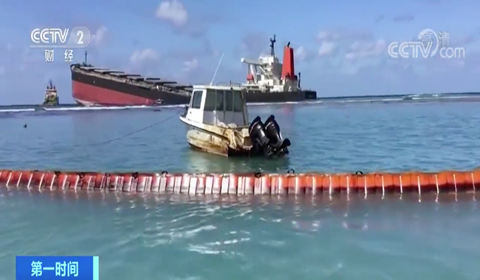Mauritian Prime Minister Jagnarth recently held a press conference to announce that
about 530 tons of fuel had been drawn from the ruptured oil depot of a cargo ship
stranded in the seas southeast of Mauritius. The fuel leakage has stopped at present,
but there are still about 2500 tons of fuel on the cargo ship. The hull has a risk of
further rupture.
Jagnarth said that Mauritius has set up a committee to deal with the fuel spill. This
committee will follow up on the scene and the progress of the operations.
The oil spilled cargo ship was named "Wakashio" and was owned by a Japanese
company. The ship was stranded in the waters southeast of Mauritius on July 25,
and all crew members evacuated safely. According to local media reports, the
cargo ship carried about 4,000 tons of fuel oil. On August 6, the hull of the
cargo ship broke and a large amount of fuel was leaked.
It is estimated that about 1,000 tons of fuel have leaked into the nearby sea.
Emergency response team members and thousands of volunteers are cleaning
up oil pollution in nearby seas and shores. Japan’s Mitsui Co., Ltd., the operator
of the "Wakachao," and the ship’s owner, Changpu Steamship Company,
respectively apologized to Mauritius on August 9 for this incident. Japan has sent
a working group to assist Mauritania in the aftermath.
Mauritius declared an "environmental emergency" on August 7, and the school
in Mahébourg near the sea area was closed. The Ministry of Environment of
Mauritius has issued a statement to request people to avoid going to the
nearby sea areas such as Blue Bay and Mahebourg for avoiding unnecessary
danger.
According to 4 pm local time on the 15th, the Japanese cargo ship "Wakashio"
accidentally broke into two pieces and slowly sank. According to the Mauritian
media, the Mauritian government and civilians have collected about 728 tons
of leaked fuel, of which 225 tons will be recycled, and the remaining 503
tons will be stored in temporary storage facilities for hazardous waste.
According to a report by All Nippon News on the 14th, Japan's Mitsui Co., Ltd.,
which operates the ships, conducted an investigation into the accident. The
crew said that they were holding a birthday party on the night of the incident.
In order to connect to the WiFi signal, they deliberately let the cargo ship
head closer to the land. According to reports, this series of actions may be
the cause of the accident.
Regarding the response measures after a rock hit, Mitsui company said that
after the accident, the company immediately entrusted rescue companies
to provide assistance. The rescue team tried to lift the hull from the shallows,
but the waves were too big at the time, which seriously affected the
progress of the operations.
In an interview, Mauritian Prime Minister Jagnarth also emphasized that due
to bad weather, it is impossible to recover the fuel inside the ship, and
there is no problem with the response measures of the Mauritius government.
According to Reuters, tourism generated 63 billion rupees (approximately
RMB 11 billion) in revenue for Mauritius in 2019. The Central Bank of Mauritius
announced in May that due to the epidemic situation, the tourism industry
has lost 12 billion rupees (about 2 billion yuan) in the past two months.
Local residents and oceanographers worry that the oil spill will further
damage their tourism industry.
Mauritian oceanographer Wan Sen said that it is now necessary to carefully
assess how much damage the crude oil spill has caused to these
environmentally sensitive areas.
Driven by strong winds and ocean currents, the oil slick has now begun to
drift away from the coast, and the oil traces are scattered to the sea areas
that people cannot reach. Marine experts assessed that corals that have
lived on the coast of Mauritius for hundreds of years are facing an existential
crisis, restoration work may take decades, and some losses will be permanent.
Oil spills needs a lot of oil absorbent products,such as oil booms, oil absorbent pads,
oil skimmers and so on.
Picture (cr.CCTV2)
